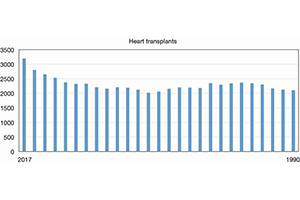The future of cardiac transplantation
Abstract
The first human-to-human heart transplant was performed 50 years ago in 1967. Heart transplantation has now entered an era of tremendous growth and innovation. The future of heart transplantation is bright with the advent of newer immunosuppressive medications and strategies that may even result in tolerance. Much of this progress in heart transplant medicine is predicated on a better understanding of acute and chronic rejection pathways through basic science studies. The future will also include personalized medicine where genomics and molecular science will dictate customized treatment for optimal outcomes. The introduction of mechanical circulatory support (MCS) devices has changed the landscape for patients with severe heart failure to stabilize the most ill patient and make them better candidates for heart transplant. As ex vivo preservation takes hold, we may witness an expansion of the donor pool through the use of donation after cardiac death (DCD) donors. In addition, further geographical donor heart sharing through ex vivo preservation may further decrease waitlist mortality by enabling longer distance donor hearts to be allocated for the sickest waitlist patient. It is no doubt an exciting time to be involved in the field of heart transplantation. In this perspective, we will summarize the present state of heart transplantation and discuss various innovations that are being pursued.
Cover






